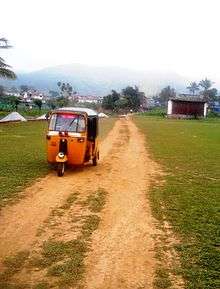Mango Orange


The Mango Orange village, officially spelt ‘mangorange’ is a small village in the Gudalur district of Tamil Nadu, India. The village is dominated by tea estates and is also very scenic. Most of the population is employed in the tea estates and there are a few schools, churches and mosques dotted around the undulating terrain.[1]
Location
Mango Orange village is 30 km from Sulthan Bathery in Kerala and 25 km from Gudalur in Tamil Nadu State of India. It is located at an altitude of 880 metres from the sea level.
History
During the nineteenth century, a London-based mining company made a township in the village and also built a Christian church and a race course. When there was no further scope for mining, the British investors shifted to plantations. Coffee and tea plantations were created in a massive scale. Many European people settled here and supervised the work. A large number of Indians from the Malabar region were employed in the estates.
| Mango Orange | |
|---|---|
| Tourist Village | |
| Coordinates: 11°29′48″N 76°20′09″E / 11.49676°N 76.33597°ECoordinates: 11°29′48″N 76°20′09″E / 11.49676°N 76.33597°E | |
| Country |
|
| State | Tamil Nadu |
| District | Nilgiris |
Demography
At present, the whole village is dominated by tea estates of Tantea or Tamil Nadu Tea Plantation Corporation Limited, Harrisons Malayalam Limited of the RPG Group and Parry Agro Industries Ltd of the Murugappa Group. This village is a sacred place for the aboriginal communities like Paniyas, Kurumbas and Kattu Nayakas. Today the population of the village is a mixture of migrated Sri Lankan Tamils, Gowdas and Kerala Muslims. The village is famous for small scale gold mining activities done by the tribal people.

Elephant Attacks
In 2016, Mango Orange village filled national headlines because of a series of deaths from elephant attacks.[2]
See also
- Pandalur
- Devala
- Vaduvanchal town
- Meppadi town
- Gudalur, Nilgiris city
References
External links
- Bharatmap.in
- Indiamapia.com
- History of Mango Range village and personal experience of Sinna Dorai
- Narration and photograph by Poorna and Brinda